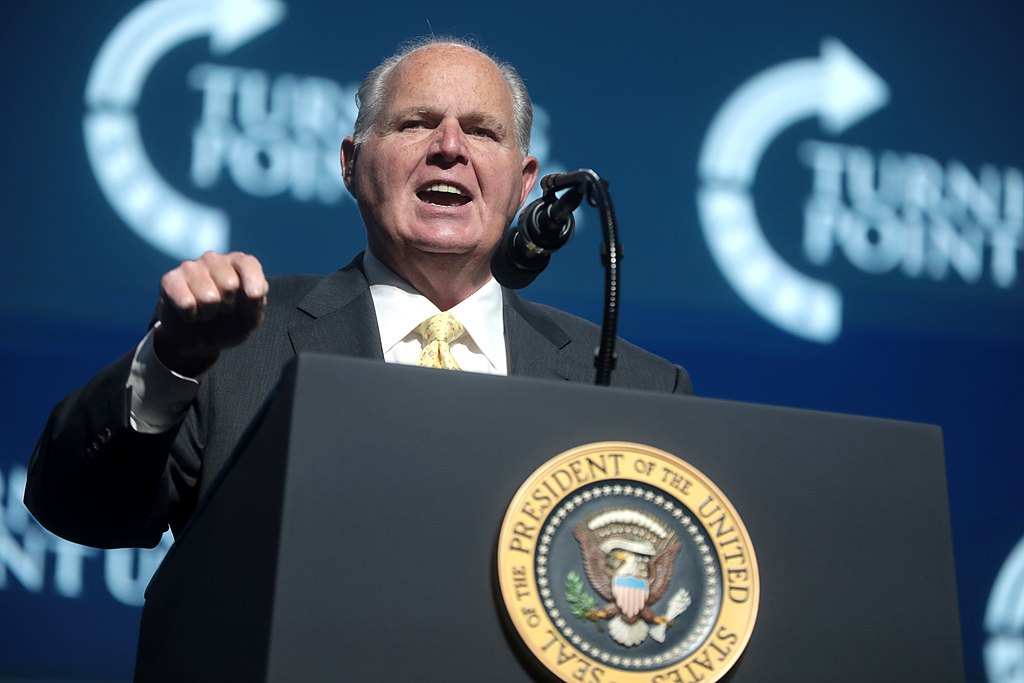
A shocker: Rush Limbaugh, the pioneering conservative talk show host and conservative icon who has for decades been at the top of the ratings and influence heap, announced on his show that he has advanced lung cancer.
Talk radio king Rush Limbaugh stunned his 20-million member audience Monday with the announcement he’s been diagnosed with “advanced lung cancer.”
The 69-year-old conservative talk pioneer closed his broadcast with the grim news, saying he will be leaving his golden EIB microphone for treatment, but hopes to return later this week.
“This day has been one of the most difficult days in recent memory, for me, because I’ve known this moment was coming,” Limbaugh said. “I’m sure that you all know by now that I really don’t like talking about myself and I don’t like making things about me… one thing that I know, that has happened over the 31-plus years of this program is that there has been an incredible bond that had developed between all of you and me.”
The radio icon then told his audience that his job has provided him with the “greatness satisfaction and happiness” of his life.
“So, I have to tell you something today that I wish I didn’t have to tell you. It’s a struggle for me because I had to inform my staff earlier today,” he said. “I can’t help but feel that I’m letting everybody down. The upshot is that I have been diagnosed with advanced lung cancer.”
Limbaugh is a highly polarizing figure. I am someone who was initially a fan when he came on the air in the mid-80s because his initial program was more humor and satire than straight political talk. Since I was then a full time journalist on a newspaper, I began to notice some facts on his show weren’t facts. I then subscribed to a mailed newsletter composed of pages of Limbaugh assertions tested against facts (they often did not coincide). Let’s just say it was a thick newsletter.
Many will write pro and con about Limbaugh (I have been anything but a fan since his show took a serious political turn and he became a GOP kingmaker). But two things are certain:
(1) He is perhaps the most influential radio talker of the 20th early 21st century. He begat a slew of Limbaugh copycats and wannabes Many of them faded over the years. I call Sean Hannity “Limbaugh Lite.” Hannity is basically a PR interviewer, activist and propagandist. Limbaugh begat a ton of copycats using the same format and cashing in on the fact that a conservative talk show could succeed in getting a demographic of listeners to tune in repeatedly — and this demographic could be offered to advertisers.
His style begat Fox News, which fused highly opinionated conservative radio talk with news. Fox News and Limbaugh begat the short-lived liberal talk show network Air America which had hosts trying to use the Limbaugh model on the progressive side. With the exception of Rachael Maddow, all of those faded. Air America flopped because rather than try to create its own model it attempted to use the Limbaugh model. Fox News, which melded the Limbaugh style with news then begat MSNBC, with CNN eventually altering much of its 20th century serious-about-news style to be similar to Fox News’ style on some of its shows as it moves into the 21st century.
(2) No matter how I ever felt about Limbaugh or his views, one thing always set him apart from other conservative (and some progressive) talkers: Limbaugh is a skilled broadcaster. His background was in radio, starting in Sacramento. His pacing was always superior to many other talk shows. But that 1980s newsletter would still material if it was in business. Which still doesn’t take away his great skill as a broadcaster.
Twitter has been crammed with Tweets about Limbaugh, some less than sympathetic to his illness. Someone wrote that no matter what anyone feels about Limbaugh (a hero to some and despised by some others) no one should ever wish ill of someone who is battling cancer. On that (as someone who has lost several people to lung cancer) I just add: Ditto.
TWITTER POSTS ON RUSH LIMBAUGH’S ILLNESS
Joe Gandelman is a former fulltime journalist who freelanced in India, Spain, Bangladesh and Cypress writing for publications such as the Christian Science Monitor and Newsweek. He also did radio reports from Madrid for NPR’s All Things Considered. He has worked on two U.S. newspapers and quit the news biz in 1990 to go into entertainment. He also has written for The Week and several online publications, did a column for Cagle Cartoons Syndicate and has appeared on CNN.
















